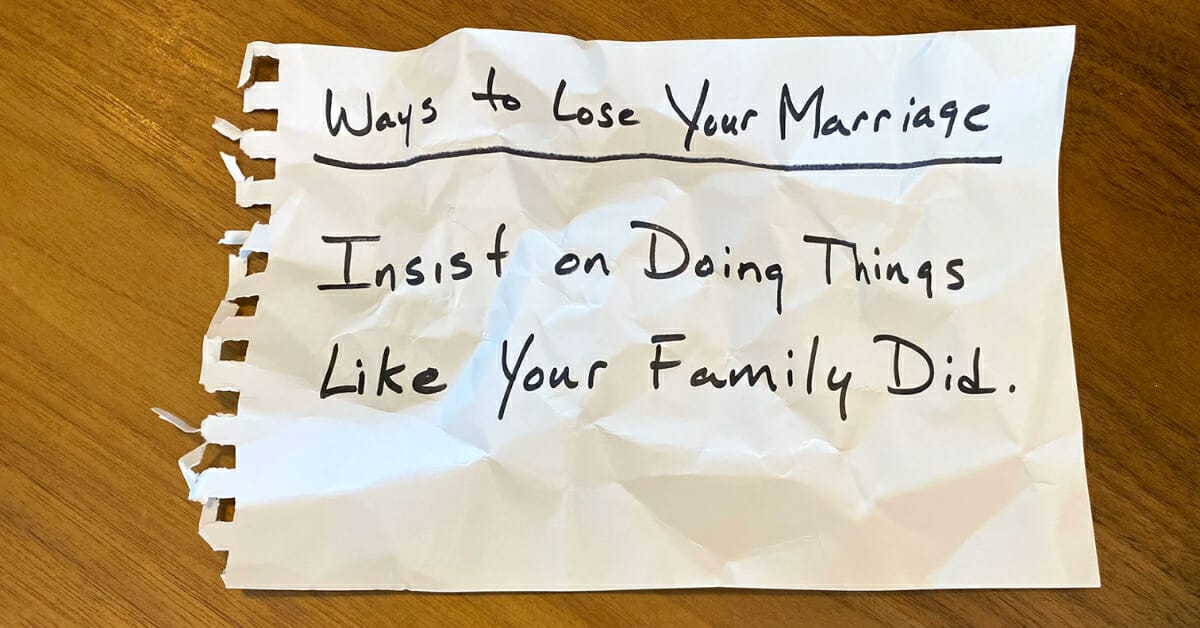We’re all familiar with children needing a time-out when they’re having trouble controlling themselves, but there are times when spouses need a time-out also. I’m not talking about taking a time-out from marriage, but rather taking a time-out in marriage.
THE SITUATION.
If you’ve been married any length of time, you’ve probably experienced something like this:
You and your spouse are in the middle of a “DISCUSSION” when you begin to realize things are heating up and heading south. And you know if things continue it’s not going to be good, because…
- You’re getting tense.
- Your pulse rate is rising.
- You feel offended, defensive, or angry.
- You’re raising your volume
- You want to attack or withdraw.
- You’re thinking or saying things you wouldn’t normally think or say.
- You no longer remember…or care…what started it. You just want it to end.
From time to time, every couple will find themselves in one of those “discussions.” It’s just part of sharing life together.
THE REASONS.
There are a lot of reasons why you might need to take a time-out…
- The “discussion” comes at the end of the day when you’re tired and spent.
- The “discussion” comes after a day of difficulty.
- The “discussion” addresses something you’re especially sensitive or passionate about.
- The “discussion” seems to attack you, your personality, or the way you were raised.
- The “discussion” just keeps coming up and never gets resolved.
Whatever the reason, there is something about this “discussion” that moves things from a spark to a blaze. And if you don’t do something, everyone’s going to get singed…or burnt to a crisp.
It’s during times like these that you need to call a time-out. That’s right…children are not the only ones who need a time-out. Sometimes spouses need one too.
HOW DOES IT WORK?
When things are getting heated, taking a time-out is easier said than done. So here are 6 rules of engagement when it comes to taking a time-out…
- Talk about the time-out strategy before you need it. Don’t just spring this on your spouse without having discussed it with them ahead of time. That could come across as a way of shutting them down. So sometime, when things are good between the two of you, bring up the idea of time-outs as a way of not getting into hurtful fights. (Who wouldn’t want that?!)
- Signal a time-out. When things are getting heated, use an agreed-upon sign to signal when you need a time-out. You can use the “T” sign used in sports, or any other sign you agree on. Make it something fun, but NO MIDDLE FINGERS!
- Explain why you called the time-out. Let your spouse know that the time-out is about you. Tell them that you’re getting to the point where you’re afraid you will say or do something that would be hurtful to them, and you don’t want to do that.
- Give them a reconnect time. This is important. Without giving your spouse a time when you will come back and re-engage in the discussion, it will feel like you’re just blowing them off to get them off your back.
- Keep your reconnect time. This is equally important. If you do not keep your promise to finish the discussion at the set time, your spouse will not trust any further time-outs you ask for and will keep pressing you. Keep your word and reconnect at your promised time.
- Repeat as needed. This is not a one-and-done tactic. You will need to repeat this from time to time. But the more you do it, the better your “discussions” will be.
So the next time things are getting heated between you and your spouse, try taking a time-out. I promise you’ll eventually get further with less damage than continuing to let things heat up until there’s nothing but scorched earth.




